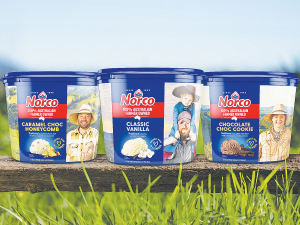Flood-hit Aussie co-op shuts plant, sheds staff
One of Australia's last remaining dairy co-operatives has closed its ice cream factory and sent staff home eight months after devastating floods ripped through its operations.
 Australia’s largest dairy co-operative Norco is back making ice cream, 18 months after a catastrophic flood destroyed its manufacturing plant.
Australia’s largest dairy co-operative Norco is back making ice cream, 18 months after a catastrophic flood destroyed its manufacturing plant.
Australia's largest dairy co-operative Norco is back making ice cream, 18 months after a catastrophic flood destroyed its manufacturing plant.
Norco, which is also Australia's oldest dairy co-op, has announced it will be launching two new ranges this summer, including the much-anticipated return of Norco Cape Byron, a premium ice cream brand from the mid-1990s.
While the co-op has not commented on the final cost of the rebuild, Australian media reports say that it would be in the vicinity of A$60m-$70m.
Norco was awarded a $34.7m anchor business support grant from the federal and NSW governments to assist with the rebuild, with $21.38m received and accounted for during the 2022-23 year.
Chief executive Michael Hampson told ABC Rural that a significant level of flood mitigation works have been done and a significant amount of automation.
He says the resilience measures built into the site were up to a 15-metre level, higher than the 2022 record floods.
"Previously that site, if it had a 12.2m flood, which is 1974 flood height, you would be down for a couple of days while you clean up the yards," he says.
"Our ambition is, if we end up having a flood like what we had last time, that we might be down for a week whilst we tidy a few things up, and as soon as power and services are restored to the region, we'll be able to back up and operate."
To relaunch its new ice cream range, Norco roped in cookbook author and Northern Rivers food afficionado, Magdalena Roze.
"Living in the Northern Rivers, partnering with Norco just made sense as we both hold a deep connection with our local communities, and are always looking for ways to give back to the region. That's what farmer owned, Australian owned and Australian made is all about," says Roze.
"We are surrounded by dairy farms here, so Norco is a big part of the Northern Rivers fabric. It's a heritage brand that we know and love, so I'm excited and honoured to be a part of this delicious next chapter."
Also being launched into supermarket freezers is Norco's 100% Australian Farmer Owned range, a celebration of Norco's milestone of over 70 years of making ice cream in the heart of Lismore.
Ben Menzies, Norco general manager of commercial and strategy explains the connection between dairy quality and ice cream craftsmanship: "We are proud of our ability to combine the rich and creamy milk produced by a co-operative of passionate Norco dairy farmers, with our expertise in crafting the tastiest ice cream on the market," says Menzies.
"With over 128 years of expertise in dairy, we understand the simple pleasures derived from sharing good quality ice cream with family and friends, and pride ourselves on our ability to deliver products that put a smile on the faces of all those who enjoy dairy," he says.
Established in Byron Bay, New South Wales in 1895 Norco is owned by 281 active members on 188 dairy farms in northern New South Wales and southeast Queensland. Annual milk production is 226 million litres.
New Zealand and Chile have signed a new arrangement designed to boost agricultural cooperation and drive sector success.
New DairyNZ research will help farmers mitigate the impacts of heat stress on herds in high-risk regions of the country.
Budou are being picked now in Bridge Pā, the most intense and exciting time of the year for the Greencollar team – and the harvest of the finest eating grapes is weeks earlier than expected.
The Real Estate Institute of New Zealand (REINZ) has released its latest rural property report, providing a detailed view of New Zealand’s rural real estate market for the 12 months ending December 2025.
Rural retailer Farmlands has released it's latest round of half-year results, labeling it as evidence that its five-year strategy is delivering on financial performance and better value for members.
OPINION: "We are back to where we were a year ago," according to a leading banking analyst in the UK, referring to US president Donald Trump's latest imposition of a global 10% tariff on all exports into the US.
OPINION: Expect the Indian free trade deal to feature strongly in the election campaign.
OPINION: One of the world's largest ice cream makers, Nestlé, is going cold on the viability of making the dessert.